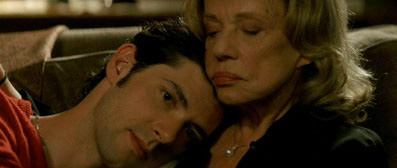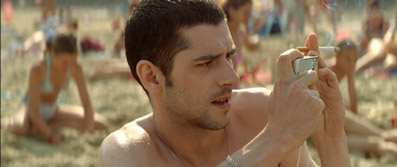|
I
have for some time been a fan of the cinema of François
Ozon, and it's only by accident
of chance that I've not covered one of his films here before. Then again, I still find it difficult to actually clarify
just what it is that defines an Ozon film.
I passionately defended his first full length feature, the
1998 Sitcom, against an unfairly hostile
reaction from some at our cinema screening (as many others
loved it, I should add). I retrospectively discovered his
sometimes delightful short films, was caught thoroughly
on the hop by the climax of Water Drops on Burning
Rocks, was wide-eyed with joyful disbelief at the
song-and-dance madness of 8 Women (and
once again found myself defending an Ozon film in the face
of some audience hostility), and was gripped by his Charlotte
Rampling double, Under the Beach and Swimming
Pool. I've criminally failed yet to catch the highly
regarded 5x2.
In
spite of all this, Time to Leave [Le
Temps qui reste] caught me completely off-guard.
The story centres around Romain, a successful 30-year-old
fashion photographer who is diagnosed with terminal cancer
and given only a few months to live. And before you try
to second guess where events will take us next, you should
know that this is not a film about disease or suffering
or the pain of loss, but how one man comes to terms, in
his own very particular way, with impending and premature
death.

The first thing that strikes you is the economy of Ozon's storytelling. The film opens on preparations for a rooftop photo
shoot, and Romain's job, his status, and even elements of
his personality are established in a matter of seconds. Moments
later, seemingly overwhelmed by the sunlight, he collapses.
Cut straight to the diagnosis, and it's bad news. "Is
it AIDS?" he anxiously asks the doctor. When it isn't
there is clear relief – he's ready for anything after that.
With just that one, three-word question, Ozon suggests Romain's
sexual preferences – old fears die hard and the legacy of
the 80s lingers on.
The doctor comes clean over the odds of survival – which
are small – but Romain is young and with treatment the doc
believes he might, just might, be able to fight it. Romain is not convinced and refuses medical help. As he
sits outside contemplating the devastating change in direction that his life
has suddenly taken, we are just five minutes into the film.
You begin to get a flavour for just how much Ozon can very
comfortably fit into the 85 minute running time.
Coping
with terminal illness may not be exactly new cinematic territory,
but Ozon's approach differs markedly from the norm by way
of his central character and his very individualistic reaction
to the illness. His first tears are shed alone, and far
from seeking the comfort and family and friends, he immediately
sets about shutting them out. After making heated love to
his boyfriend, he then breaks up with him, and at a dinner
with his family he leaves his sister in tears and his parents
confused. You keep expecting him to come clean to them about his condition, to engage their sympathy and share
his burden, but he never does. The only person he does tell
(and this happens before we arrive at the scene, side-stepping
a moment that most such stories would revel in) is his grandmother, played by the wonderful Jeanne Moreau. When she asks why he has told her,
he replies with almost cruel directness, "Because you're
like me, you'll be dying soon."
On
paper, this casts Romain as both selfish and uncaring, but
his purpose is not to deliberately hurt those around him,
but to put them at a distance, to isolate himself in order
that he may be allowed to die quietly on his own terms, without fuss
or fanfare. As played by Melvil Poupaud, he is immediately
intriguing and becomes increasingly sympathetic, with his situation
disarmingly easy to empathise with. Gradually, the cool front
he has put up begins to falter, with even his confrontations with
those close to him peppered with moments of extraordinary
tenderness, from a goodbye said to his father to a phone
call made to his sister to patch up the rift between them,
two pitch-perfect moments that pack an extraordinary emotional
wallop. This is not the false sentimentality of Hollywood
tear-jerkers, but a genuine and complete bond with Romain
and his fate. It thus makes sense that the film sprung from Ozon's own speculations on
how he might spend his final days when he was awaiting a potentially
serious diagnosis (he, unlike Romain, was given the all
clear).

It
would be a hard-hearted person that would not be moved by
Romain's subsequent journey towards the inevitable. The
combination of Poupaud's sensitive performance and Ozon's unfussy but precise direction make this an utterly
believable and sometimes heart-rending experience. Even
when the story looks to be taking a contrived or more obvious
turn – an unusual request made by a café waitress
(Valeria Bruni Tedeschi), Romain's memories of his childhood
– the scenes are so well handled and their integration into
the story so effective that you soon feel foolish for even momentarily
questioning the decision to include them.
Doubtless
there are those who will allow their prejudices to prevent
them from even seeing the film, let alone engaging with the central
character (to be honest, if you have a bigotry check list
you're not even going to sit down for this one), and as
far as I'm concerned it's their loss. Time to Leave
(and oh, is that title well chosen) avoids the emotional
histrionics, over-sentimentalising and false dignity so
often associated with such stories, and yet it tears at the
heart without ever being depressing or even particularly
downbeat. Ozon demonstrates that if you care, really care
about your lead character, however he may behave to others,
then you can tell a story that is both warmly life affirming
and tragic at one and the same time. Nowhere is this more
evident than in the quietly overpowering final scene, which
I freely admit had tears running down my face. There's no
two ways about it – Time to Leave is
without question one of the most profoundly moving and beautifully
realised films I have seen in years.
Framed
2.35:1 and anamorphically enhanced, this is a superb transfer
in every respect – colour, detail and contrast are close
to reference quality, and although some minor compression
artefacts are just visible in some of the darker scenes,
you'd have to be looking for faults to be even remotely
bothered by them.

There
are two soundtracks available, Dolby 2.0 surround and 5.1
surround. To be honest there's not much to choose between
them – the mix is a subtle as the film itself and the sound
quality always first rate, especially in the reproduction
of the lovely, melancholic score.
In
the Interview with François Ozon
(21:00), the director talks about the genesis of the film,
the central character, the editing, the cutting of scenes
for a more minimal approach, his filming technique, and more. He covers the casting and working with the
actors in some detail, and expresses a belief in the importance
of accidental discoveries and a reluctance to plan his shots
in advance of the actual shoot.
The
Making Of Documentary (76:07)
was partly responsible for the late completion and posting
of this review – so wrapped up did I become in the drama that it
was a good three days before I was ready to see it deconstructed
as a technical process. When you are up for it, though,
this is a substantial extra feature, running for almost
as long as the film itself. Invaluable for showing Ozon
at work and useful for detailing the process of preparation
and filming, it is allowed to ramble a little but is always
interesting and is peppered with intriguing behind-the-scenes
moments, notably some insecurity and crew concern surrounding
actor Christian Sengewald, who plays Romain's lover Sasha.
Jeanne Moreau provides a short voice-over interview on working
with Ozon, whom she later gives a neck massage to when the
pressure gets too much.
One point of interest thrown up but not answered by this
documentary involves a night club fisting scene, whose detailed
preparation may seem like overkill for the brief and only
suggestive sequence that appears in the final film, or at
least the version seen here. The completed scene is both longer and more explicit than the one in the
UK cut. According to the BBFC web site no cuts were
made to either the cinema or DVD release of the film, suggesting
that this version was prepared specifically for the UK market,
or was recut before the final release.
There
are number of Deleted Scenes (18:18),
and they are not the usual timecoded video copies, but complete
sequences, scored and edited and of similar quality to the
feature (though non-anamorphic). All are interesting, and
there's quite a bit more childhood stuff here.
The
original French Trailer (1:43)
is subtitled in English and cut to Lou Reed's Perfect
Day, which isn't in the film.
Finally
there are Filmographies for Melvil Poupard, Jeanne Moreau,
Valeria Bruni-Tedeschi and François Ozon.
As
I said above, Time to Leave caught me by
surprise, in part because I watched it without knowing the
plot, but mainly because even with a few Ozon films under
my belt I was not ready for how affected I would be by this
gorgeously handled story. I cannot be objective here – I
loved every beautiful moment of this remarkable film.
Artificial Eye's DVD really is excellent, with a superb
transfer and almost two hours worth of quality extra features
(discs that masquerade as a 'special edition' with
only trailer and a 20 minute interview take note) – even
the menus are impressively done. Very highly recommended.
|